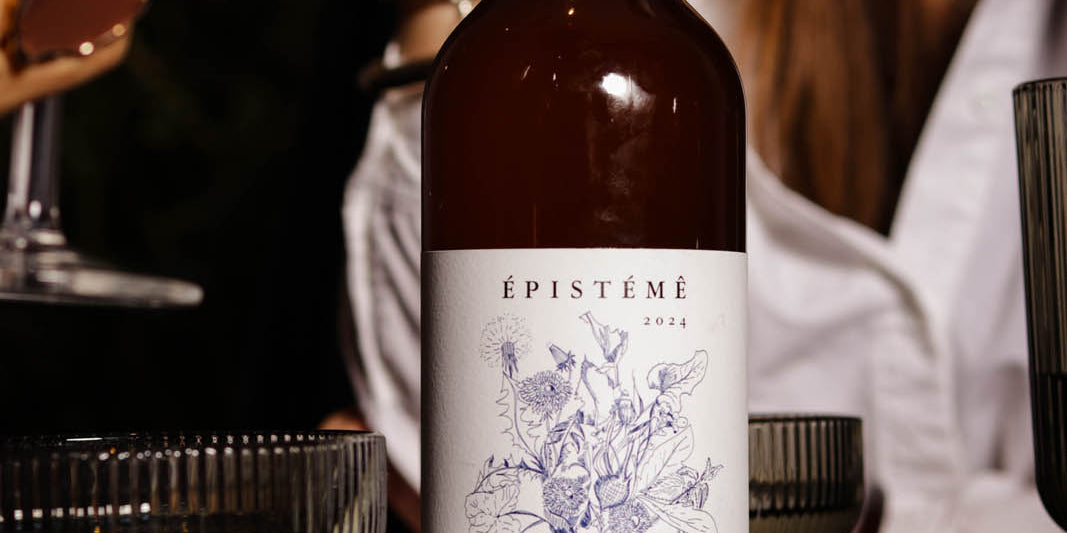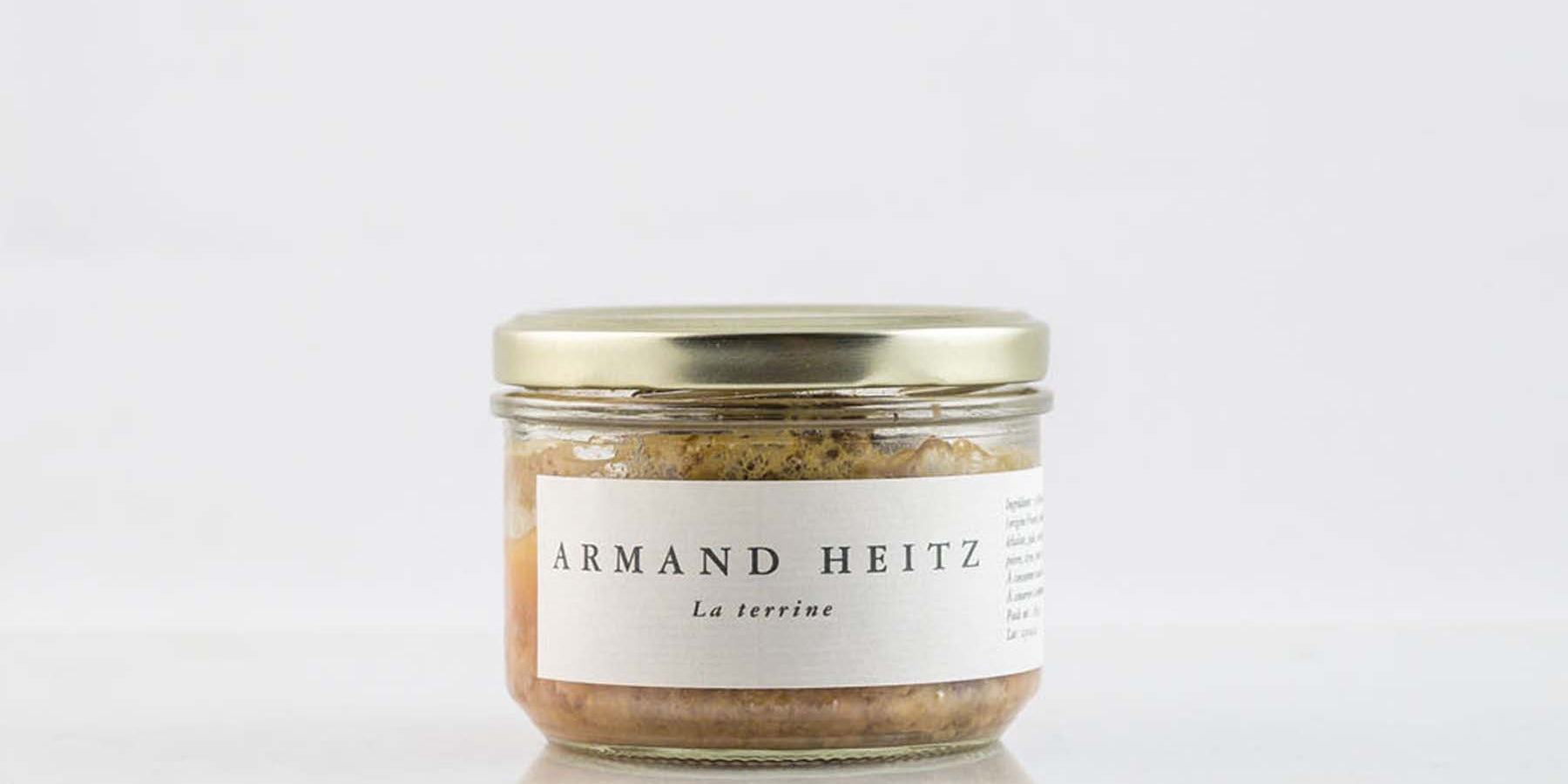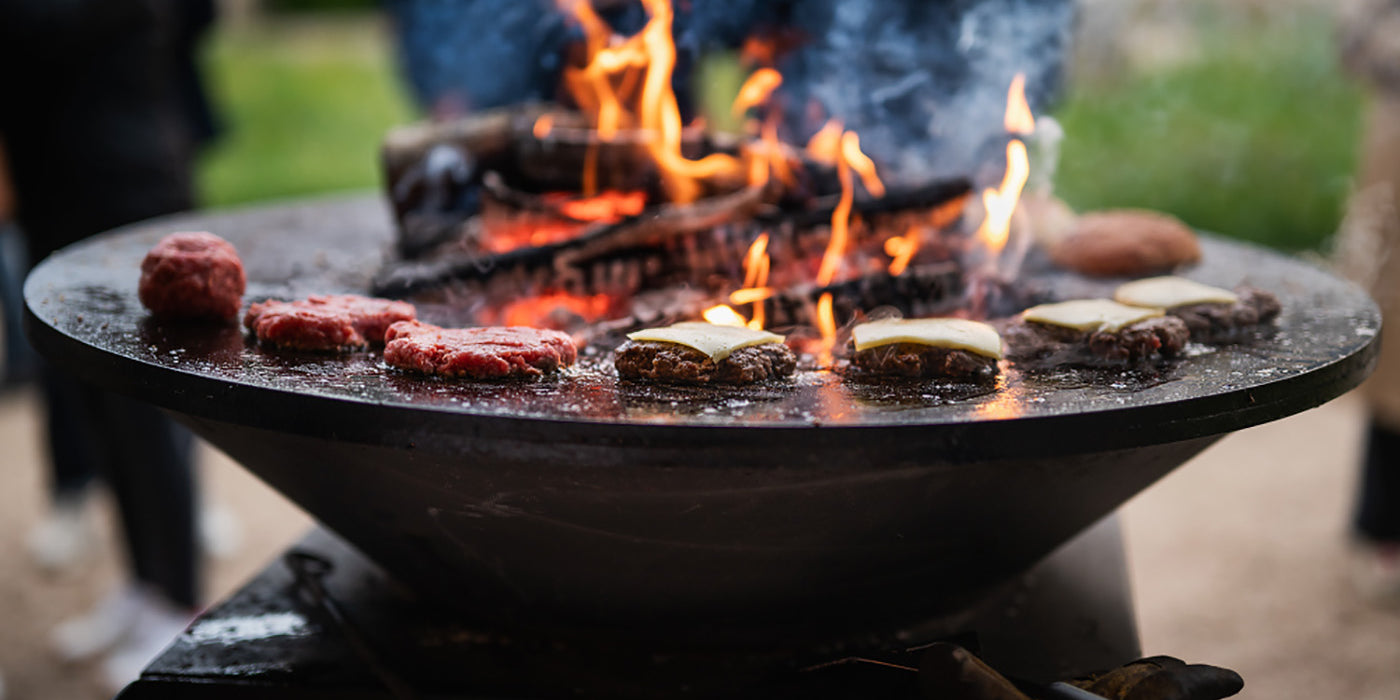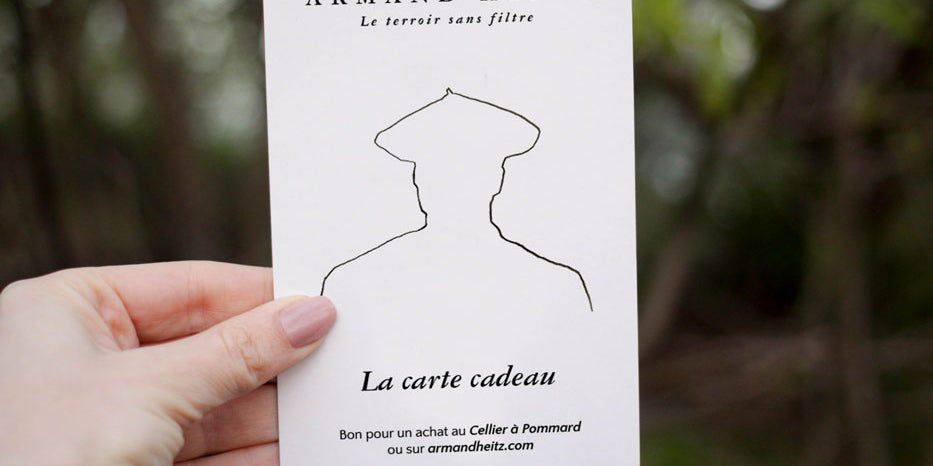EXERGUE
The Cistercian monks of Cîteaux largely contributed to the development of the Burgundy vineyard. Armand Heitz, winemaker and farmer who has been living in Chassagne-Montrachet since 2013, wanted to meet the monks who now live at the Abbey and produce the famous Cîteaux cheese. After an initial interview at the Abbey, Brother Bertrand and Brother Benoît came to the estate to discuss at greater length.
ACT FIRST
SUBJECT: THE RELATIONSHIP BETWEEN CISTERCIAN MONKS AND WINE
Thursday, June 17, 2021, in the secular chapel of Château Armand Heitz
Tasting of the 2020 red Burgundy
Brother Bertrand: The story between monks and wine started early. The first land donation that was made to the monks of Cîteaux took place in 1099. It was a vineyard in Meursault.
Brother Benoît: One cannot be a monk without wine since to celebrate the Eucharist, one needs wine. In the Middle Ages, in all places where there were monasteries, even the most improbable places, there was a vine not too far away. Even in Ireland they were able to grow vines.
Brother Bertrand: The Burgundy vineyard was established several centuries before the monks developed it. What made the difference was the population of monks, which was very large at the time. When they took possession of the vines, they were able to cultivate them in a more rational way, more profitable too. What small winegrowers could not do alone, the monks were able to undertake and develop it.
Brother Benedict: The monks had the ability to mobilize both smart people and capital, but also to work for the long term. Cîteaux, being very close, quickly had significant possessions on the coast and the capacity to put competent people there and to invest there with a desire for progress.
Brother Bertrand: Under the old regime, the Abbey of Cîteaux supplied Versailles with wine. Burgundy was truly favored by royalty, more so than Bordeaux.
Armand Heitz: I find that we do not put enough emphasis on the work of the Cistercian monks who largely contributed to the richness of the Burgundy vineyard. This is a strong legacy that we benefit from today.
Brother Benoît: At the time of the Unesco classification, there was research on the role of the monks of Cîteaux. They did not use us in the sense of abusing us, but the image of Cîteaux was used as an argument benefiting the classification.
Armand Heitz: In Burgundy, each plot has well-defined agronomic specificities. This definition of the hierarchy of wines that we have today, which is one of the strong values of our vineyard, is largely due to the work of the monks.
Brother Benoît: Yes, the monks contributed a lot to the identification and characterization of the plots.
Armand Heitz: Today it is the INAO that manages our appellations, it is a disaster. They call into question things that have been established for years, they do not manage to federate the profession at all. We recently received a report for the improvement of the ecological management of the vines, but they are twenty years late... Our appellations are not going in the right direction.
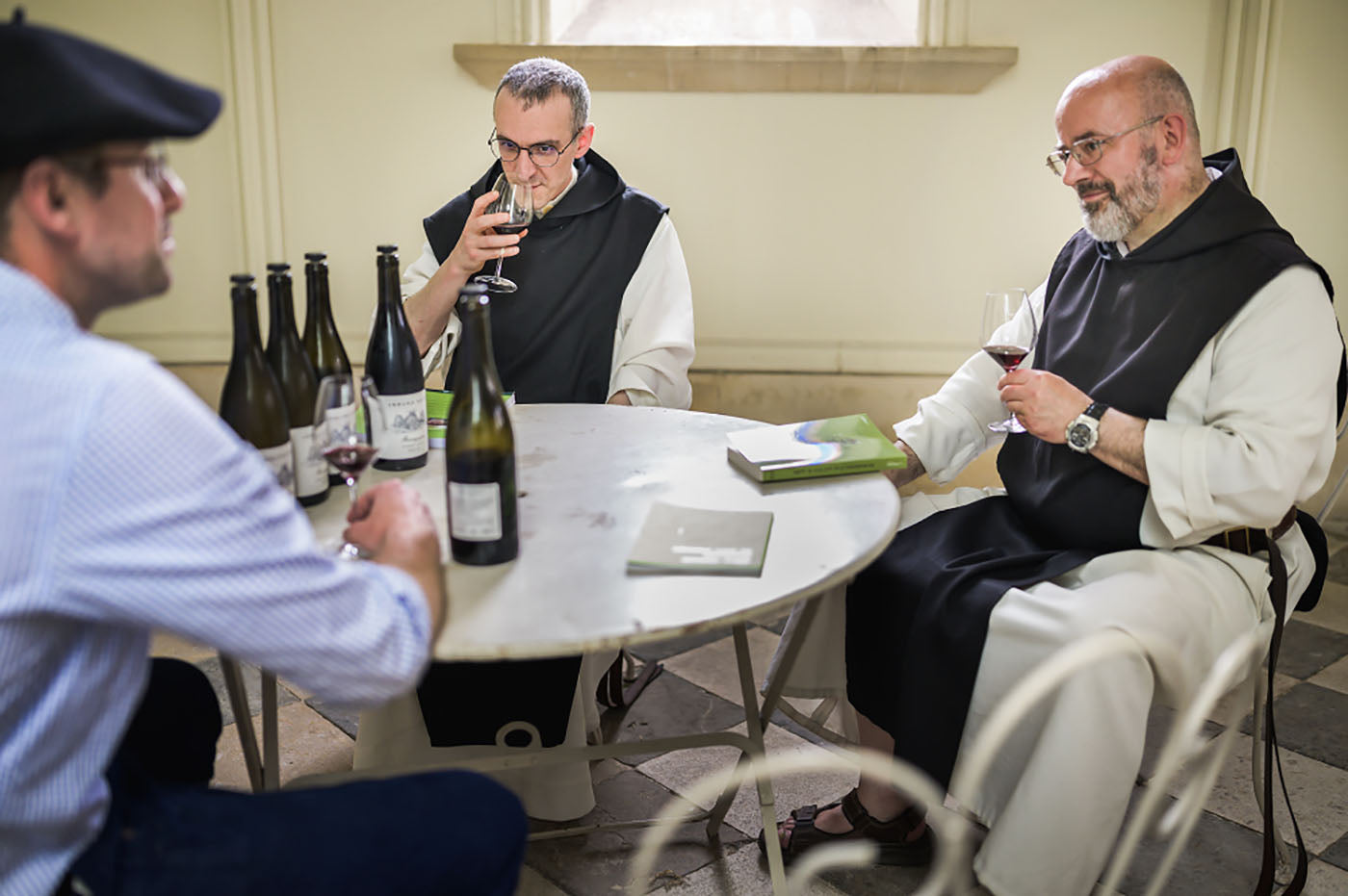
INTERMISSION
Armand Heitz: Let's not lose sight of the main thing and continue with our 2019 Pommard
Brother Benoit: The Burgundy red was good!
Armand Heitz:Pommard has a slightly more masculine image of wines, and this one is quite full-bodied, with lots of fruit.
Brother Benoît: I find it more subtle than the previous Pinot, which was good, but this one has great aromatic richness, more complex. It's pleasant, on the nose too.
Armand Heitz: Yes, it's quite fresh too, we would drink it well.
Brother Bertrand: For reds like these, what is the serving temperature?
Armand Heitz: It depends on the weather, how you are... With temperatures like today, we gladly serve it two to three degrees below what we are used to serving. You have to be between fifteen and twenty to be sure not to make a mistake.
Brother Benoît: Like cheese.
Armand Heitz:Exactly! But I always say that a great wine will be good hot, cold, lukewarm, young, old... Everyone must adapt according to their taste. It is not up to the producer to say at what temperature a particular wine should be drunk. We don't all have the same palate. Basically, wine was mixed with water, it was food. Today we do something sacred with it, but we have to relax a bit and remember that we were drinking wine despite the quality of the water.

SECOND ACT
SUBJECT: SPIRITUALITY IN AGRICULTURAL WORK
The same day, still in the secularized chapel of Château Armand Heitz
Tasting of the 2020 white Burgundy
Brother Bertrand: I find this white very good, sweet, delicious.
Armand Heitz: It's quite young, but we have the sunny side of chardonnay, intense.
Brother Bertrand: Spirituality is embodied in both intellectual work and manual work. It conditions the way we work and view work. When I was in charge of the barn, we received student trainees, and I noticed their completely different mentality and their conception of work. Those who were planning to take over the family farm, they dreamed of it so that they could do everything they wanted. Totally the opposite of what their fathers did, it really struck me. I knew some over several generations, and often one in two generations did the opposite. The grandson acted like the grandfather against the father. This is a mechanism that I have observed several times. With us, that is unthinkable. We take something, we can try to improve it but we benefit from a whole know-how. It is impossible to have this will to break. Unfortunately today, things have broken down a bit, there are not enough of us anymore. Our economic model has changed, because we work with employees. In past centuries, before all this machinery arrived, the transmission of knowledge was very strong.
Brother Benoît: At the cheese dairy, we manage living things, a certain biodiversity. We must master without controlling. It is impossible to be able to absolutely control, we must maintain a microcosm. Spirituality helps us understand this. Take care of an environment that we do not control but on which we can interact. For me, it's the same feeling as when we celebrate the liturgy.We find an environment on which we have an action but on which we have no control. I am a cantor, the music speaks to me a lot. It is also a manual action in the sense that we have a material, with an action/reaction over which we have no absolute control.
Brother Bertrand: Spirituality will play a big role in the way we carry out our tasks, whatever they may be. Currently I take care of the accounting for example. There is a priori not much to do with spirituality, but it is felt by the way of doing... A monk does not work for himself, he works for others, he entered to live a relationship with God. He will try to live it every moment, not only when he is in the church. And that changes everything. We are not going to work under stress. We will try to be efficient but we do not work for the money. We have another mentality. Between us, with our employees, even with tools or objects, we will have a different relationship. Saint Benedict in his rule says about the cellarer: “he will take care of things like the sacred vessels of the altar”. It is above all at this level that spirituality acts, in our way of being and doing.
Armand Heitz: My vision of my job and my life changed, and for the better, the day I realized that I had to put spirituality into what I was doing . When I left school, I worked to produce grapes, to make the most of them. Everything that society teaches you in some way. Running constantly behind a profit was not a life... Fortunately, nature is the first to break this access. I told myself that it was necessary to see differently, to work with nature without wanting to control it. As Brother Benoît said, we can have an interaction with it, but it is incoherent to wish to tame it. My search for happiness has refocused on other aspects, taking care of Nature, of my employees. Since that day, I've been happier.
Brother Bertrand: Pope Francis, in his Encyclical Laudato Si, his “ecological” Encyclical, indicates that one cannot have a good relationship with nature if one does not have a good relationship with Others. He advocates an integral ecology, that is to say that it begins with the relationship to Others. This is what sets the record straight and makes us work in the right direction. Currently organic is fashionable, so everyone is doing organic. When I was a cowherd, I visited farms in the Doubs that produced organic-labelled Comté cheese. These breeders put constraints on themselves that seemed exorbitant to me with excessive specifications. I could not believe my eyes. You can make good milk even with silage. The important thing is not to make just any silage, not to supplement it anyhow and to see concretely what it does at the production level. For Christians, ecology can only be integral.
Armand Heitz: The system is made up of man and nature, it has to be whole, one cannot go without the other.
Brother Bertrand: Today, industry has only one purpose, which is to fatten shareholders. Giving work and in good conditions to a population is totally secondary. If we can replace them with robots, that's even better. There is no ecology in all this.

ACT THREE
Always the same day, late afternoon, in Loaris, the permaculture garden of Armand Heitz
SUBJECT: THE DEFINITION OF A VIRTUOUS MODEL
Brother Benoît: There is no perfect model. There are just optimum models at a particular time in a particular environment. Purism can turn into a trap. You must never get tired of searching, adapting. To give a concrete example, we are changing the feeding technique for cows in Cîteaux, for several reasons. First, we had a big fire that made us wonder. Also, forage conservation techniques have evolved. Today, we can quite easily dry them in the barn and preserve a good quality food without necessarily ensiling. Modern techniques are not necessarily bad, they can even make it possible to find more traditional ones, in order to take what is durable. One of the strengths of monastic life is to never get too carried away and hurry slowly. Agriculture is slow work, if we want to change it we have to adapt to this slow pace.
Brother Bertrand: I even think that we are obliged to resist ambient fashions. Agriculture in general is made for the maximum of profit, of profitability. As a result, we arrive at totally perverted practices. For example, deforestation in some Asian and South American countries for intensive monoculture. In France, some would be ready to go towards this kind of practice, which is done more or less. Our life is oriented towards God, so in everything we do, it must first be oriented towards Man, and Man towards God.
Armand Heitz: For my part, I would say that a model is virtuous when it has a social dimension, when it is economically sound and when its relationship to the land and nature is respectful. It is a balance to be found, a bit like a wine. This can be compared to the Pope's Encyclical, moreover. Indeed, I also agree with the fact that it cannot be established and set in stone. Just like nature, it must evolve and we must accompany this evolution.
END
Transcription and formatting: Fabrice Pastre
Photographs: Jib Peter
.


